Are “fairytale” net-zero mandates only going to end in tears?
Net-zero emissions mandates, which aim to achieve zero net greenhouse gas emissions, are increasingly being adopted by governments and companies around the world as a way to combat climate change.
2040 prediction: 400,000 hydrogen-powered ICE units
The adoption of hydrogen-powered engines in the trucking industry will depend on a number of factors, including the availability of hydrogen fuel, the development of supporting infrastructure, and the overall cost and performance of these engines compared to other alternatives.
Japan to continue to ship Russia LNG despite pushback
While harsh sanctions have been imposed on Russia and its companies since February 2022 and the invasion of Ukraine, Japan has hesitated to join the fray.
Offshore wind energy technology expected to grow in 2023
The global offshore wind technology trend is expected to only grow over the upcoming twelve months.
Climate change is reconstructing how the manufacturing industry
Extreme weather events such as heatwaves, floods, and hurricanes can disrupt production and supply chains.
$750 million DOE grant issued to hydrogen technologies for heavy-truck fuel cells
The U.S. Department of Energy must be feeling generous after a commitment of $750 million to assist in lowering the cost of lower the cost of hydrogen technologies for heavy-truck fuel cells, hydrogen delivery, and hydrogen storage.
USPS fleet to be 75% EV by 2028, due to IRA funding
The Inflation Reduction Act was signed into law by President Joe Biden back in August, and the US Postal Service is looking to benefit.
Nikola celebrates CARB’s executive order, hydrogen fuel cell electric truck coming soon
Nikola Corp.’s Tre hydrogen fuel cell electric truck is soon to be commercially available after CARB’s recent certificate of compliance to its most recent emissions standards required for sale in California.
Japan extends the lifespan of its nuclear reactors in bid to maximize the fuel tech post-Fukushima
Japan is one of the world's leading users of nuclear energy, with a fleet of 50 reactors that supplied approximately 20% of the country's electricity prior to the Fukushima Daiichi nuclear disaster in 2011.
New EPA standards may put small trucking companies out of business, says OOIDA
The Owner-Operator Independent Drivers Association (OOIDA) is slamming the EPA over what they’re defining as “unrealistic regulations” for the trucking industry.
EPA has updated its standards for the first time since 2001
The Environmental Protection Agency’s tougher pollution standards will be issued for compliance on 2027 models of large trucks, delivery vans, and buses.
Hydrogen energy solutions provider Plug Power is looking to usher the world to carbon neutrality
Based in Albany, New York, Plug Power is developing what they have called a “green hydrogen highway.”
Reducing emissions in trucking is becoming a leading issue on the global stage
At COP27 in Copenhagen, Denmark this November, international leaders discussed carbon-related emissions from heavy trucks, both long-haul and drayage.
GM vs. Ford: asking their dealerships to implement public charging stations
The two American automakers are squaring off for the country’s EV market and have announced plans for nationwide charging networks for their vehicles.
Riding the school bus to school is cleaner, but also costlier, than ever
Electric school bus fleets are growing as environmentalists begin to see the fruits of their labor, but school districts are now facing a complicated array of hoops to jump through in order to obtain one - or ten.
Shipping industry CEOs gear up for decarbonization
While the European Union, the International Maritime Organization (IMO), and several individual countries are tightening their sustainability and carbon footprint standards, shippers are planning to meet them head-on.
Chinese solar manufacturing giants buckle down against international trade challenges
China is asking some of its biggest solar panel manufacturing companies to get tough and hold steady against an incoming barrage of international “threats” to their trade power.
Who’s to blame for climate change?
China tops the list by far, with the U.S. coming in second. The United States is historically the largest emitter and sits responsible for 20% of all emissions - however, its fossil fuels have helped it grow into the nation it is today.
California has a plan and the world is looking to follow it
California’s CALSTART Drive to Zero program aims for 100% of new medium- and heavy-duty vehicle sales to be zero-emission by 2040.
Labor and environmental supplier audits are often ripe with scams
According to Human Rights Watch (HRW), a global organization that tracks and protects human rights in some 90 countries, the published study “Obsessed with Audit Tools, Missing the Goal” shows that business practices are often misrepresented during these audits.




















